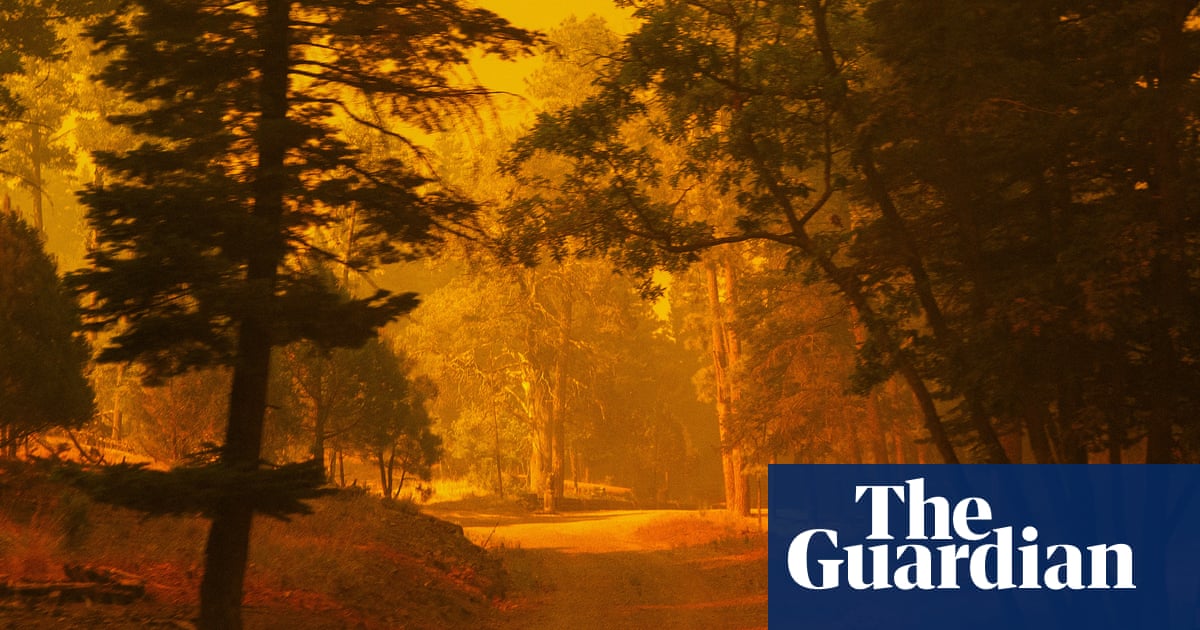Two fast-moving fires forced panicked evacuations and consumed hundreds of buildings in New Mexico, as firefighters struggled to bring the blazes under control on Tuesday.
Plumes of crimson-colored smoke curled over the village of Ruidoso in southern New Mexico on Monday evening after the fires broke out, as officials issued an urgent warning around 7pm: “GO NOW: Do not attempt to gather belongings or protect your home. Evacuate immediately.”
By Tuesday morning, approximately 500 structures had been lost to the flames, according to official estimates, and that number could increase. With critical fire weather lingering in the forecast through Wednesday, the blazes, both still listed at 0% containment as of midday Tuesday, were expected to grow.
Fueled by gusty winds, high temperatures and low humidity, the South Fork fire roared across about 14,000 acres (5,666 hectares) in a drought-stricken part of the state after igniting on the Mescalero Apache Reservation on Monday. Fire crews battled through the night, working to protect the homes and buildings they could, as the fire exhibited extreme behavior and long-range spotting.
The Salt fire, which also ignited on the Mescalero Apache Reservation, is churning through steep forested terrain to the south of Ruidoso, home to more than 7,000 people, and has burned roughly 5,000 acres.
A state of emergency has been declared both by New Mexico’s governor, Michelle Lujan Grisham, and by the Mescalero Apache Tribal Council, to speed recovery and response funding into the region.
“The horrific South Fork fire and Salt fire have ravaged our lands and property, and forced thousands to flee their homes,” Grisham said. “We are deploying every available resource to control these fires.” She also thanked first responders and the nearby town of Roswell, “which rapidly stood up shelter for evacuees”.
Greg Cory, a Ruidoso city councilor, told the Associated Press that he hadn’t heard of any injuries or fatalities, but described the fire as “out of control”. He and his family were among hundreds of Ruidoso residents who had fled for their lives through traffic-clogged downtown streets in the normally pastoral vacation destination, as smoke darkened the evening sky and 100ft (30-metre) flames climbed a ridgeline.
Christy Hood, a real estate agent in Ruidoso, said Monday’s order to evacuate came so quickly that she and her husband, Richard, only had time to grab their 11-year-old son, 15-year-old daughter and their two dogs.
“As we were leaving, there were flames in front of me and to the side of me,” she said. “And all the animals were just running – charging – trying to get out.”
They headed out of Ruidoso, but heavy traffic turned what’s normally a 15-minute drive into a harrowing two-hour ordeal.
“It looked like the sky was on fire. It was bright orange,” she said. “Honestly, it looked like the apocalypse. It was terrifying and sparks were falling on us.”
New Mexico has been in the grips of drought, with more than 12% of the state classified as in extreme drought by the US Drought Monitor, mostly concentrated across the south.
“This is climate change. It is hot, and it is dry,” George Ducker, the communications coordinator of the New Mexico forestry division told the New York Times on Tuesday. “There is some moisture potentially coming on Wednesday, but I’m not holding my breath.”
Forecasters with the National Weather Service in Albuquerque said the “hot, dry and breezy conditions will prevail across most of the region today with areas of smoke from nearby wildfires,” but that severe storms are also possible near the Texas border Tuesday evening with higher chances of rain into the weekend. “Good chances for showers and storms will continue Thursday through Saturday, with an increasing threat for burn scar flooding,” they added. “After a brief break from the heat, temperatures will return to normal by Sunday and trend above normal early next week.”
The New Mexico fires are among dozens of large, uncontained blazes burning in the US, with months of increasing risks still ahead.
Swaths of California have also been subject to smoke-filled skies this week, as fires swept through the yellowing hillsides across the state. More than 66,000 acres have already burned in California this year, with the state bracing for a long season that forecasters expect will stretch into the autumn.
The largest active blaze in the state, dubbed the Post fire, has scorched more than 15,600 acres in Los Angeles and Ventura counties since it ignited last Saturday, spurring the evacuation of about 1,200 people.
Despite extreme conditions Monday night, with wind gusts up to 40mph and poor humidity recovery that threatened progress, California’s department of forestry and fire protection has reported 24% containment by Tuesday morning. Fire weather is expected to continue through the day, complicating the firefight.
“Steep, rugged terrain and expected weather conditions will challenge firefighters throughout the day,” officials said in a Tuesday status update, noting that power facilities, oil lines and recreational areas are among the critical infrastructure threatened from the fire.







